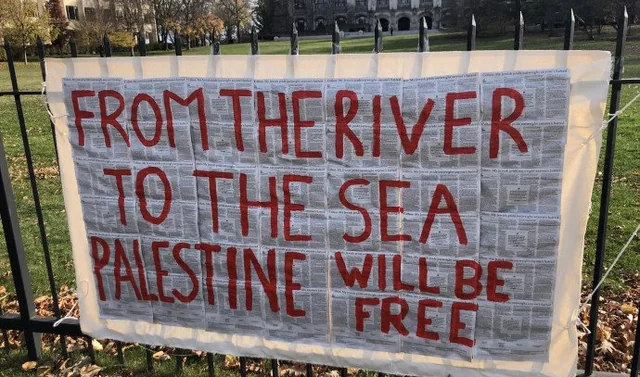“From the river to the sea” has become a highly controversial slogan, especially in the context of the ongoing Israeli-Palestinian conflict. Recently, Germany has implemented a new law that explicitly denies citizenship to individuals who share, like, or comment on this slogan on social media platforms.
The move is part of a broader effort by the German government to combat antisemitism and preserve democratic values within the country. This decision has stirred debates, raising questions about freedom of speech, national security, and Germany’s role in addressing growing tensions between various communities.
The Meaning Behind ‘From the River to the Sea’
The phrase “from the river to the sea” refers to the area between the Jordan River and the Mediterranean Sea, which encompasses both Israel and Palestine.
Read : Israel-Palestine Conflict: From 1948 to 2024
Those who use this slogan often advocate for Palestinian freedom across this entire region, which would imply the dismantling of the State of Israel. Supporters of Palestinian causes argue that the slogan symbolizes resistance against occupation, while critics, including groups like the Anti-Defamation League, label it as antisemitic.
Read : Saudi Arabia Removes Palestine from School Textbook Maps
According to its critics, the slogan calls for the destruction of Israel and denies the Jewish people’s right to self-determination, a key aspect of the ongoing conflict.
Germany’s move to associate the use of “from the river to the sea” with antisemitism underscores its zero-tolerance policy toward hate speech and incitement. By making this phrase grounds for citizenship denial, the country has drawn a clear line between supporting Palestinian freedom and promoting violence against Israel.
Germany’s New Citizenship Law
The revised citizenship laws in Germany have introduced several changes aimed at fostering integration while also protecting national security. Under the new rules, foreigners can now apply for German citizenship after five years of employment, as opposed to the previous eight-year requirement.
However, these updated regulations also come with new conditions, particularly regarding a commitment to democratic values and historical responsibility.

As part of the stricter guidelines, anyone found promoting antisemitism or racism will be ineligible for citizenship. The slogan “from the river to the sea” is now explicitly cited as part of this rule, as it has been linked to antisemitic sentiments.
This decision aligns with Germany’s broader commitment to combatting Holocaust denial, hate speech, and the promotion of violence against Jewish communities. Interior Minister Nancy Faeser was clear in her statement: “If you don’t share our values, you can’t get a German passport. We have drawn a crystal clear red line here.”
Implications of Using ‘From the River to the Sea’
Germany’s stance on the use of “from the river to the sea” marks a significant shift in its naturalization policies. The slogan, which in simple terms calls for the destruction of Israel, has long been a point of contention.
While some view it as a symbol of Palestinian resistance, others interpret it as a denial of Jewish self-determination, further deepening the divide in the Israeli-Palestinian conflict.
By prohibiting its use in the context of citizenship applications, Germany is signaling its position on the global stage as a defender of Israel and a nation committed to preventing antisemitism.
Those who share, like, or comment on posts using this phrase on social media will be flagged under the new regulations. This is a significant change, as it places a responsibility on individuals to carefully consider their online activity.

In an age where social media plays a critical role in public discourse, this move could spark discussions about free speech and the boundaries between expressing political beliefs and promoting hate.
For many, the phrase “from the river to the sea” carries deep emotional and political significance. However, Germany’s Interior Ministry views it as a threat to its democratic values and the safety of its Jewish population.
The Anti-Defamation League has also emphasized that the slogan contributes to a hostile environment for Jewish individuals, making them feel unsafe and ostracized.
Combating Antisemitism and Protecting Democratic Values
Germany’s updated citizenship laws are part of a larger strategy to address the rise of antisemitism and racism in Europe. With the country’s history deeply tied to the atrocities of the Holocaust, Germany has consistently positioned itself as a leader in confronting hate speech and ensuring that such violence is never repeated.
The inclusion of the “from the river to the sea” slogan in these new regulations highlights the government’s dedication to combating any form of rhetoric that threatens Israel’s existence or promotes hatred toward Jewish communities.

This policy also raises important questions about freedom of speech in democratic societies. While Germany has been clear in its stance against hate speech, some critics argue that the decision to ban certain slogans could stifle political expression. However, the German government maintains that this measure is necessary to uphold the nation’s democratic values and protect minority communities from harm.
As Germany enforces its new citizenship law, the phrase “from the river to the sea” becomes a focal point in discussions about free speech, antisemitism, and the ongoing Israeli-Palestinian conflict.
By linking this slogan to citizenship denial, the German government is taking a firm stance on what it perceives as dangerous rhetoric that could incite violence against the Jewish community.
This decision, while controversial, reflects Germany’s commitment to preserving democratic values and protecting its citizens from the spread of hate speech and extremism.
As debates continue, this development also serves as a reminder of the complex and often divisive nature of the Israeli-Palestinian conflict.
The implications of using “from the river to the sea” on social media will undoubtedly spark further discussions about the responsibilities of individuals in a digital age and the ways in which nations address hate speech in their efforts to promote peace and unity.

